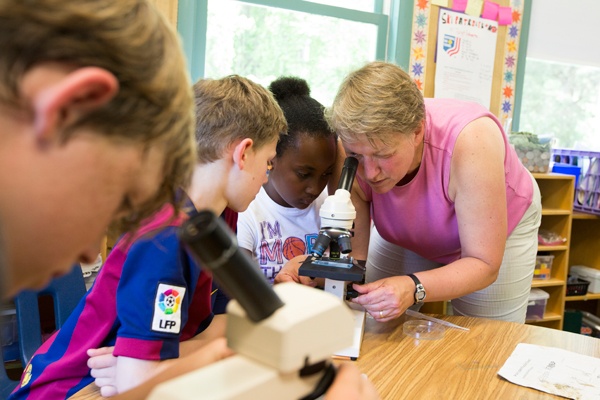
Why do we go to school? To learn. To be taught. So parents can work. To prepare children for the work force. To socialize kids. To impart certain skills. These answers, while not wrong, seem dated, certainly uninspired, and out of synch with a world that has changed rapidly in a short period of time. Is the internet a game changer? How about globalization? Does the complexity of today's challenges--income inequality, climate change, dysfunctional States-- call for a re-think of the question "Why do we go to school”?
Schools have always been in the business of transferring knowledge. In the not-so-distant past, schools played an essential role in deciding what knowledge was most valuable, given that the teacher, the text book, and the curriculum created a virtual monopoly on information. That monopoly, the information cartel, has been shattered by the device you are reading this on.
From the perspective of Sandy Spring Friends School--really all Friends schools--what a blessing. We are ready for what comes next; in fact, we have been ready for the past 325 years. While the world continues to change, this is not the first time Quaker educators have had to consider a response to a paradigm shift.
Sandy Spring Friends School values learning and we value thinking. We also value unlearning. What do I mean by unlearning? Think about what Quakers have unlearned. When everyone else said that kings were appointed by God, Quakers said no, there is that of God in equal measure in each of us. When Charles Darwin stepped off the Beagle and said that species evolve and that the world is much older than we thought, that too challenged prevailing wisdom. Quakers’ attitude was “let’s use science and challenge it some more.”
We have a special way of teaching and learning. It works for unlearning too. It can be described as Question – Reflection – Action, or Q-R-A for short. We ask questions, meaning we are open to new and unexpected concepts. We reflect on the answers using critical thinking and analysis, testing of hypotheses, and contemplating possible alternative approaches. We continue the process of question and reflection, which in turn leads to action. Action may mean applying new knowledge to a practical purpose, adjusting thinking to adapt to new ideas, or revising a creative work to improve or expand upon it. Question, Reflection, Action.
We have a lot to unlearn. We are in the process of unlearning how to cure cancer, how to lessen our reliance on fossil fuels, how to build stronger communities. We are taking small, tentative steps. Nonetheless, we know that Q-R-A, Sandy Spring's acronym for inquiry-based education, works. That's why we learn the way we do, in small groups, collaboratively and independently doing projects, seeing the world, striving for cultural competencies. And it is why we have opportunities to sit in silence, to work on our own farm, to climb trees, to perform in musicals, to excel in sports, to conduct science experiments, to craft poems, and to celebrate and actively participate in community service. We believe that by striving, we make the world nicer, better, and cleaner.
When Sandy Spring Friends School first started back in 1961, the neighbors who got together had to unlearn the idea that regular people--including some who had not gone to college--can’t start schools. They persisted because they wanted our school to be a place where--and I quote our School founder Brook Moore--“we get a kick out of being here."
Our job is to question, to reflect, to act: to look ahead and behind in our quest for truth, to persist in making Sandy Spring Friends School (again quoting Brook Moore) "a place where we leave feeling happier and more loving for having been exposed to the Sandy Spring Quality of Spirit.”
